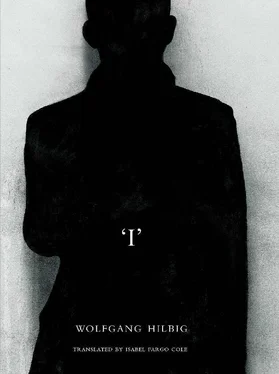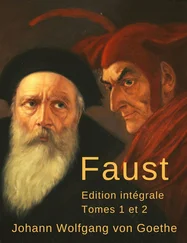The goal of the service was to make everyone. . I said: Everyone ! he thought. Everyone without exception. . into collaborators of this service, insane though this notion might sound. So that all could be watched by all — that was a security worthy of its name. — No, the thought wasn’t new. . and it alone meant that the service wasn’t merely there for the individual, but rather was a service for all. Wasn’t that the unspoken goal of all great utopias, from Plato and Bacon to Marx and Lenin? Everyone in everyone’s hands, perhaps this was the ultimate goal of utopian thinking. . and hence the utopians’ secret desire for anarchy, since anarchy brings the thought of collapse to the surface and necessitates the thought-watching service in the first place. Ultimately they’d have had to approve of their own surveillance, those utopians. . and didn’t they, in the end?
Feuerbach was quite right to say, as he often did: I can tell by looking that you’re taking off again. Your mind is already set on the great goal. But that’s not our business, we’re the men with feet planted in daily routine, in the centre of the movement, we have to hold the path, there’s no way we’ll still be there when the goal’s reached. We have to keep our feet on the ground. — These were big words, they confused him. . though possibly he’d merely formulated them himself in an attempt to articulate Feuerbach’s innuendoes. The Major engaged in virtually nothing but innuendo; he was said to have taken several years of philosophy, one of the reasons why W. always felt at something of a disadvantage with his case officer. . every attempt to think Feuerbach’s tossed-out phrases through to the end seemed to wind up as a mental short circuit, abruptly cutting off his own thoughts. But in this the terms of their relationship were preserved: Feuerbach was the superior. . Strictly speaking, I think like my superior, W. said to himself; and thus it remained.
I can practically tell by looking. You’ve always got to think everything through and plot it out to the end, said Feuerbach. What is it with you? Do you refuse to believe that other people have done it much better before you? If all you ever do is draw conclusions, and conclusions from those conclusions, isn’t there a point where you don’t even know what the beginning was?
Feuerbach was right about this as well; here too W. thought the same, all too willing to be roused from his broodings and listen instead to his master’s voice. — It really was smarter to sit down at last, to lean back, eyes shut, for all I care, shutting out reality, and find out how the whole story had begun. What had set him on this path whose goal was so remote that it would take generations upon generations to get there. — This was the most self-explanatory question, as superfluous as asking the reasons for his birth. And at this moment, every time, his fatigue gained the upper hand. . and he heard Feuerbach’s voice lecturing on even as he drifted down into the grey world of sleep in which he was freed from all interconnections.
Feuerbach said: You know what, we can’t even let ourselves reach the goal, because we’re never wrong. We can only act as though we want to reach the goal. You’ll kick and scream, but I’m telling you anyway: We are in possession of the sole truth. And for that very reason we can only act as though we were in possession of the sole truth. You know, we can’t even let ourselves think it. No, we can’t, since every truth exists only through its opposite. If we were proved right, and the sole truth really were on our side alone, we’d be abolishing the proof of the truth. That’s why we can only act as though we believed in it. . otherwise we might end up abolishing truth itself. We’d instantly be nothing but a hollow bluff if we ever achieved the state of sole truth. Probably the classless society would be the most horrific carnage you could possibly imagine. Let’s not even go there. Let’s go on making the most of our measly talents. . and jailing people who refuse to believe our bombastic blather. Because that’s where they all belong. .
In other words, on a fundamental level you disbelieve in human goodness?
The very idea! It’d mean we’d immediately have to believe in the accuracy of every statement that lands on our desk. We’d have to take all the selected works of yours you supply us with as the gospel truth, and the same for all the other selected reports. For instance, when we get the assessment that someone. . let’s say you for instance. . that this Someone, that is, someone like you, is supposedly less intelligent or less dangerous than the lady friend he associates with, then we know we have to go by the opposite of this characterization. But that doesn’t preclude our also having to go by the exact wording of the report.
I don’t even have a lady friend, I’m telling you with no hint of sensitivity.
We always have to go by the opposite of a statement like that. And then again by the opposite of the opposite. . we’ve worked at this art for a long time, practically done drills in it. You ought to take more of an interest in dialectics, that’s the science we need, as long as we’re still on our way. . and unfortunately you don’t show much sign of it. .
Feuerbach’s closing sequences were always especially impressive. These and many other phrases from the lips of his case officer had accumulated over time in W.’s memory, and during his leisure hours in the basement they would unwind almost of their own accord. The assessment was all too justified: W. had long begun to think exactly like his superior. — But this thought gave him no satisfaction.
His conversations with the Major sidestepped all hints as to how his career had begun. . by which W. meant his career as an Unofficial Collaborator or UnCol of the ‘Firm’ (this was the standard term, which the institution’s members had evidently put into circulation themselves). . he had always wondered whether Feuerbach even knew anything about it. He himself saw the memory lapse as a result of his overlong sleep phase; that was evidently why the time was referred to this way, serving as it did to obliterate all the reasons for your ‘collaborator’s’ existence, so completely that it looked as though you’d acquired the position in a dream. . that is, according to Freud, as the result of a wish fulfilment fantasy. — It was hard to say how this happened; evidently each prospective collaborator had moments in his past he found necessary to conceal, believing them to be irreparable lapses; it had to be a blunder capable of causing lasting remorse. And when the repercussions were out of proportion to their cause, and the patient saw his offence, or his transgression, as the kind of existential catastrophe he’d find it hard to live with, the ideal conditions were in place for a dependency on the Firm. . if necessary they had to be achieved by first stoking the patient’s sense of guilt. The patient’s sleep now served to heal his crisis of conscience; he awoke with the happy feeling of being a blameless, worthwhile person. . once this phase was over he was surrounded by a hermetic space of profound silence regarding his deed. — Was it even a deed, in W.’s case? This was exactly what the hermetic silence made it impossible to learn.
No wonder he got the idea that all such catastrophes in the former lives of the Firm’s employees had been meticulously planned and carefully constructed. The Firm was the world’s most moral institution, pedantically registering every transgression that could possibly be developed. And when W. gave it serious thought, it struck him that this was its one and only function: the collection of punishable factors, or what looked like punishable factors, for every subject it singled out. And as practically every subject came into question as a collaborator for the service, the never-ending task of the apparatus was to create conditions in which a reservoir of punishable factors stood at the ready for, in principle, everyone . And should the utopian state be achieved in which no more offences occurred, or hardly any, then the limit would have to be lowered and lowered until ultimately almost every action could be classified as an offence. When this system came to an end, what a seed of offence would shoot up from its soil. . I didn’t want to think about it: at any rate, we were essential for this reason alone.
Читать дальше












